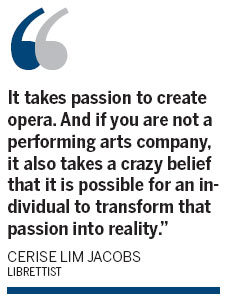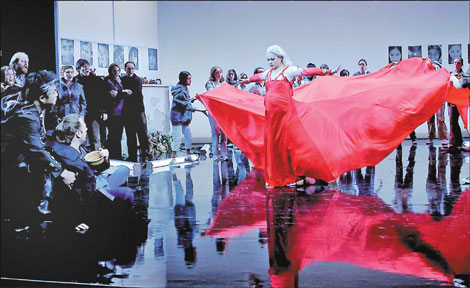Life and Leisure
Journey of the Snake
By Chen Jie (China Daily)
Updated: 2010-10-26 08:01
 |
Large Medium Small |
|
The Chinese legend of Madame White Snake takes on a modern look in this autumnal scene symbolizing White Snake's pregnancy. Provided to China Daily |
A childhood memory and a birthday plan morph into a full-length opera and Beijing Music Festival's first cooperation with a US opera company. Chen Jie reports
Which romantic teen has not penned a song or poem to his or her beloved as a birthday gift? But how many would do this in their 50s? That too for a whopping $2.2 million? Cerise Lim Jacobs, a retired Chinese-American attorney, can take credit for both, with her birthday surprise for her husband morphing into Opera Boston's first major commission and world premiere in 40 years.
It is also the first English libretto based on a Chinese legend and the first time the Beijing Music Festival has cooperated with an American opera company.
After a successful premiere in Boston in February, the opera, Madame White Snake, is now touring Beijing.
The original vocal cast of soprano Huang Ying in the title role, male soprano Michael Maniaci as her maid Xiaoqing, tenor Peter Tantsits as her lover Xu Xian, and bass Gong Dongjian as Abbot Fahai, will join the chorus from the Central Conservatory of Music and the China Philharmonic Orchestra for the Oct 27 show at the Century Theater, in Beijing.
Born to Chinese parents in multicultural Singapore, Jacobs moved to Australia with her family to escape the turbulence created by the end of the Vietnam war in 1975.
She dropped out of school at 19 and went to England and later, the United States.
She learned creative writing at the University of Pittsburgh but failed to get her works published. The "failed" writer, as she calls herself, had to find a real job to make a living. So she went to Harvard Law School and later became a lawyer in Brookline.
"But I've always had a wonderful preoccupation with words, and in many ways being a lawyer is just a different kind of art, writing about complex things in a concise way in order to communicate them," says Jacobs, adding that her passion for writing never dimmed.
In 2006, two years after she retired, Jacobs wanted to write a 5-10 minute libretto and get someone to compose and sing for a few friends at her husband's birthday party.
It was while trying to create the libretto that she rediscovered the story of White Snake, something she had grown up with as a child in Singapore. There is scarcely a Chinese person who is not familiar with the myth of the White Snake, a story that has evolved through the centuries and been adapted for folk operas, TV series, movies and dance.
A white snake demon yearns to be human to experience love. After 1,000 years of mediation, the gods grant her wish. While she is transformed physically into a beautiful woman, her essence remains unchanged - she is still a snake.
She falls in love with a herbalist named Xu Xian, marries him and becomes pregnant, thus violating all taboos. Abbot Fahai sees through her and disaster strikes. Her husband betrays her, and in the moment of betrayal she is transformed back into a snake.

"The deadly white snake gives up her immortal existence to assume a human form in the pursuit of the most human of all emotions - love. She holds love dearly for a brief while, before losing it forever," Jacobs says.
"It is a powerful metaphor for each individual's struggle to (realize his or her) dream and raises such questions as 'What does it mean to be human? Can love really conquer all? Can love be real if it is based on a lie'?"
Jacobs could not contain her excitement and shared the story with her husband, writing the first draft of the libretto in one day.
"It takes passion to create opera. And if you are not a performing arts company, it also takes a crazy belief that it is possible for an individual to transform that passion into reality," she says.
Jacobs sent her libretto to 10 composers, five of them Chinese-Americans, and after much deliberation settled on Zhou Long. Zhou is known for his deft integration of Western and Eastern musical traditions.
"When we first met to go over the libretto in New York at the end of 2006, we discovered that Jacobs, myself and my wife were all born in the same Year of the Snake, 1953. We felt destiny had brought us together for the project," Zhou says.
His wife Chen Yi, also an established composer, and he were in the same, now-famous "class of 1978" - the first batch to be admitted to Beijing's Central Conservatory of Music after the end of the "cultural revolution" (1966-1976), which included composers Tan Dun, Guo Wenjing and Chen Qigang.
The couple did a lot research on the legend and suggested Jacobs develop the single act into a full-length opera.
While trying to find the right composer, Jacobs also made cold calls to opera companies and one of those was to Opera Boston. Initially they were skeptical, but were soon drawn to the power of the music and the libretto.
Yu Long, artistic director of the Beijing Music Festival (BMF), heard about the project from Zhou and was impressed. It did not take him long to agree to co-sponsor the production.
"Passion, love, fear, deceit, betrayal and death - what wonderful material for opera. What a powerful opera (this is) to introduce to a Western audience," Yu says.
One of the key missions of the BMF is to promote Chinese contemporary musicians and productions. Previous editions of the festival have shown the works of Guo Wenjing, Tan Dun, Chen Qigang and Ye Xiaogang.
"The richness of Chinese visual and musical culture and its wealth of folklore make it an attractive, legitimate source for composers and librettists," Yu says.
After the Beijing show, the opera will tour Hangzhou, Zhejiang province, where the story is set, Singapore and other Asian cities, says Beth Morrison, Boston Opera's tour producer.
